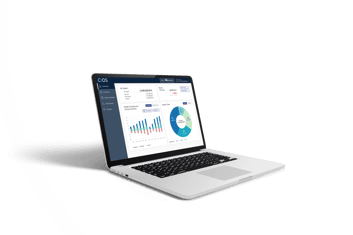
WealthTech Trends 2023
Ralf Heim / January 12, 2023
Here are the top 5 highlights of our founder and CO-CEO Ralf Heim.
2022 was a year from which, under normal circumstances, one would first have to lie down and recover: the war is back in Europe, inflation reached unexpected highs worldwide, in numerous countries, people are risking their lives for freedom rights, and achieving the world's climate goals seems further away than in the year before. In the economy, Unicorn booms and stock market records are followed by mass layoffs and massive share price declines. The scandals surrounding FTX raise the question of whether the crypto world is going into hibernation or even an ice age.
In one sentence: "There are decades in which little happens. And there are years in which decades happen," is a common saying.
In the meantime, however, we have experienced three such years. As an entrepreneur, I have often noticed opposing effects during this time. The Covid-19 pandemic halted already planned projects at our customers, as risk management became a priority. At the same time, the need for digital tools in investment consulting grew rapidly, so the number of advisors using our software multiplied rapidly. Also, the way we as a software company organize our sales and coordinate collaboration among ourselves was ultimately successful under "remote" conditions; even though I was skeptical at first. As a result, in 2022 we succeeded in going to market in seven countries - including the US. One learning that we have retained in our company: physical proximity is less important than good products and services.
Outlook 2023 and beyond - What changes do we expect in this dynamic environment over the next few years?
1. Financial advice becomes important again.
When everything (in the markets) goes up, everyone performs. When risks manifest themselves, exchange rates fluctuate, and individual investment products fail (keyword: due diligence), then the importance of financial advice becomes apparent. 2020 and partly still 2021 recorded years in the brokerage sector, with huge growth rates in the new customer segment. In 2022, the stock market climate was clearly clouded, and advisors now have the opportunity to support their customers with expert knowledge and thus clearly stand out from the self-execution market.
2. Alternative Investments go "downmarket“.
Not only since the stock market crash we see that the demand for alternative investments is massively increasing. What used to be offered more in the wealth segment is gaining access to the so-called affluent client group (€200k + investable assets) due to lower barriers to entry. Relevant providers of this investment intermediation are Moonfare, InVenture, or ArtTrade, which offer their clients access to PE, VC, or art in a franchised form. My assessment: demand will continue to grow significantly in 2023! In order to achieve broad market penetration, it is important that investors have the opportunity to invest in different asset classes on one platform. The prerequisite for this is a consistent onboarding and a top-notch user experience.
3. Return of the "Zins“ within the Asset Allocation.
In 2021, it only really made sense to invest in fixed-income investment products, bonds, or checking account under a few circumstances. But already in 2022, a small renaissance took place here. After many years of a zero and negative interest rate policy, we now have fixed interest rates again. Despite persistent inflation, the allocation to this asset class may seem reasonable again for some investors.
4. Holistic solutions for brokerage, portfolio management, and advice.
 My expectation is that there will be more and more offerings that combine brokerage and mandate business in a reporting environment as a service offering. The demand for this is clearly there and will continue to increase, as aggregation at this point enables significant added value in usage.
My expectation is that there will be more and more offerings that combine brokerage and mandate business in a reporting environment as a service offering. The demand for this is clearly there and will continue to increase, as aggregation at this point enables significant added value in usage.
5. Fokus on Affluent clients.
The affluent customer group (with €200,000 and more in investable assets) will become the focus of banks, asset managers, and advisors! While these customers have similar needs as the wealthier private bank customers (> € 1 million), banks initially earn less with them, but with modern software and digital processes, they can leverage the potential in this customer segment.
What not to expect in 2023! Three forecasts.
1. "Krypto Business as usual".
After the events at FTX and the rumors that continue to circulate around other brokers (or are they custodians?), banking regulators will monitor crypto projects earlier and more strictly. To ensure investor protection, especially for private investors, regulators will certainly impose new rules on this sector.
2. AI for financial advice as a substitute for human advice
.png?width=399&height=241&name=Bildschirmfoto%202022-12-12%20um%2012.50.04%20(1).png) So far, providers like "Open AI" have avoided using their AI in financial advice, probably for good reason, namely fear of regulation. While they provide extremely valuable impulses in educational or relationship advice, we will not see customer-focused AI for financial advice that will fully replace human advice. Nevertheless, we could see initial attempts that will support the human advisor in at least individual areas such as call logging or proposal generation.
So far, providers like "Open AI" have avoided using their AI in financial advice, probably for good reason, namely fear of regulation. While they provide extremely valuable impulses in educational or relationship advice, we will not see customer-focused AI for financial advice that will fully replace human advice. Nevertheless, we could see initial attempts that will support the human advisor in at least individual areas such as call logging or proposal generation.
3. Startup Madness such as in 2021.
Interest rates are changing the game. Whereas in the past, company valuations always outperformed each other, and the battle for talent and customers was fueled with multi-million dollar investments, things are now returning to normal. Even with a lower rise in interest rates, I do not expect a quick return to the massive overvaluations and salary overbidding of recent years.
Conclusion
Transformations cost strength, for both individuals and companies. But they also offer unique opportunities which we must not close our minds to, or as Churchill said: "Never waste a good crisis". As an entrepreneur, father and investor, I am looking forward to 2023; especially to working with my great team.
What is your view on the new year? Feel free to contact me! I look forward to your thoughts.

